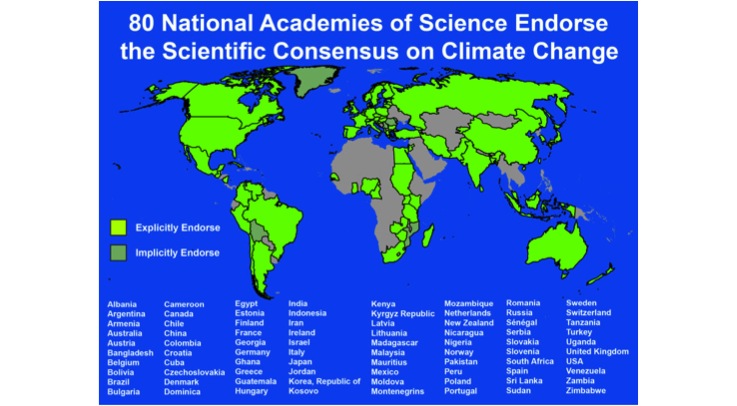- Aug 27, 2008
- 18,450
- 1,823
- 205
You can’t make this stuff up. Someone at the UK Guardian named David Grimes has declared that “economic liberalism,” by which he means the ideology of laissez-faire, “clashes” with “scientific evidence.” Which scientific evidence, you might ask? Well, the unassailable scientific dogma of global warming is one:
Climate change illustrates this well, because despite overwhelming evidence of anthropogenic influence, there is a tendency for those with pronounced free-market views to reject the reality of global warming. The reason underpinning this is transparent – if one accepts human-mediated climate change, then supporting mitigating action should follow. But the demon of regulation is a bridge too far for many libertarians.
If one accepts that global warming is a grave danger, is it nonetheless necessary to support “mitigating action” even if it can’t be shown to actually improve anything at all? Even assuming that global warming were proven beyond a reasonable doubt, the burden of proof of success is still on those who want mitigating action. Specifically, they need to be able to prove that such action has a reasonable chance of achieving the desired ends. They most certainly have not done so. Indeed, many scientists say it’s already too late to stop it. Many argue that even if major global action were taken right now, the expected result over the next century would be too small to make any difference. In other words, it’s futile at this point to enact mitigating actions. (Also here.) Presumably, if it’s too late, then there’s no reason we should still be debating mitigating action. But of course, having realized that the “it’s too late” message is a PR disaster, the message has instead been changed to “it won’t be too late if we act right now!”
By their own admission, if global controls on production and energy use are not imposed by 2020, we’re all doomed. When 2020, rolls around, however, look for the date to be changed to 2025, and so on. Indeed, the global warming gang is like the Seventh Day Adventists who kept predicting the end of the world in the nineteenth century, and then changing the date when it didn’t happen.
So, if global warming is indeed on our horizon, it would appear that perfecting technologies like water desalinization, aqueducts, improved agricultural practices, and lowering the costs of basic staples such as housing and labor-saving appliances would be essential. Much of the world has already been working on these problems, and global warming has had nothing to do with it. The Israelis have been developing better and better water and agriculture systems for decades. Many desert countries (including the western United States) have been working on better water filtration and delivery systems. Many societies, such as The Netherlands and Singapore already deal with various issues related to dense populations.
But can you guess which societies are the best as dealing with these issues? Not surprisingly, the societies that have the wealthiest populations and the most industrialized and capital-intensive economies offer the best solutions for dealing with all the problems that global warming has to offer. In other words, the most free economies offer the best hope for addressing these issues. We don’t hear much from Venezuela, for example, about the latest scientific advances in energy production, water cleanliness, and housing.
Must Free-Marketers Reject Global Warming The Mises Economics Blog The Circle Bastiat
An excellent piece on climate change, and the view from a purely free market. McMaken sums up my views on climate change perfectly when he says:
"I’m agnostic on the matter myself, although I certainly reject the ludicrous assertion that there is such a thing as “settled science” and that the matter is not debatable. And unlike many allegedly great men and women of scientific inquiry, I refuse to agree that global warming “deniers” are heretics who should be burned at the stake (or the modern equivalent of having one’s career ruined)."
The reason I'm agnostic, as McMaken puts it, on climate change is, simply put, because I'm not a scientist who has done any independent study into the matter, and I suspect that many of those with the most vociferous opinions on the matter, if they're honest with themselves, are in exactly the same boat that I am. Regardless, assuming it is true, there's no reason that we can't address the issue from a free market paradigm, as this article makes the case for.



